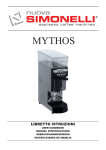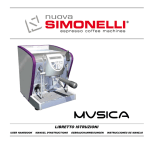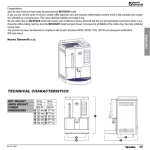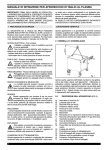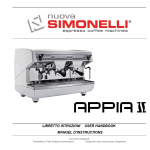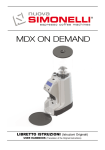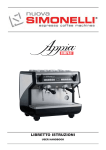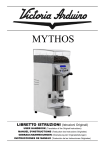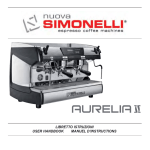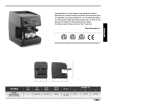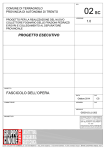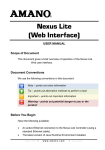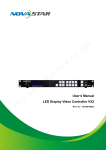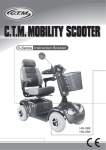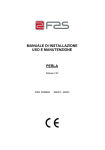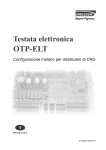Download Appia 2- and 3--Group User Manual
Transcript
LIBRETTO ISTRUZIONI USER HANDBOOK EN 60335-2-75:2004 + A1:2005 + A11:2006 in combination with EN 60335-1:2002 + A1:2004 + A11:2004 + A12:2006 + A2:2006 EN 50366:2003 + A1:2006 Congratulations, By purchasing the you have made an excellent choice. The purchase of a professional espresso coffee-maker involves various elements of selection: the name of the manufacturing firm, the machine’s specific functions, its technical reliability, the option of immediate and suitable servicing, its price. You certainly evaluated all these factors and then made your choice: the model. We think you have made the best choice and after every coffee and cappuccino you will be able to assess this. You will see how practical, convenient and efficient working with is. If this is the first time you have bought a Nuova Simonelli coffee machine, welcome to high quality coffee-making; if you are already a customer of ours, we feel flattered by the trust you have shown us. Thanks of the preference. With best wishes, Nuova Simonelli S.p.a. ENGLISH 23 TECHNICAL CHARACTERISTICS E F B D A C 2 Groups NET WEIGHT GROS WEIGHT POWER DIMENSIONS A B C D E ENGLISH F 24 60 kg 65 kg 3000 W 785 mm 690 mm 545 mm 370 mm 530 mm 135 mm 3 Groups C 133 lb 143 lb 3000 W 30⁷⁄₈” 27¹⁄₈” 21⁷⁄₁₆” D 14⁹⁄₁₆” D E 20¹³⁄₁₆” 5¹⁄₈” E A B F A B C F 74 kg 80 kg 5000 W 1010 mm 920 mm 545 mm 370 mm 530 mm 135 mm A B C D E F 163 lb 176 lb 5000 W 39⁷⁄₈” 36³⁄₁₆” 21⁷⁄₁₆” 14⁹⁄₁₆” 20¹³⁄₁₆” 5¹⁄₈” TECHNICAL CHARACTERISTICS . . . . .24 7.5 7.6 7.7 7.8 PROGRAMMING STANDARD DOSES . . . . . . . COPYING DOSE SETTINGS . . . . . . . . . . . . . . PROGRAMMING OPERATING PARAMETERS AUTOMATIC GROUP CLEANING CYCLE . . . . 1. DESCRIPTION . . . . . . . . . . . . . . . . . . . .27 8. CLEANING AND MAINTENANCE . . . . . .41 1.1 ACCESSORIES LIST . . . . . . . . . . . . . . . . . . . . . . . . . .28 2. SAFETY PRESCRIPTION . . . . . . . . . . . .29 3. TRANSPORT AND HANDLING . . . . . . . .32 8.5 8.6 STOPPING THE MACHINE . . . . . . . . . . . . . . . . . CLEANING THE OUTSIDE OF THE MACHINE . . . CLEANING THE STAINLESS COFFEE-HOLDERS CLEANING THE UNIT WITH THE AID OF THE BLIND FILTER . . . . . . . . . . . . . . . . . . . . . . . . . . CLEANING FILTERS AND FILTER-HOLDERS . . . RESIN AND SOFTENER REGENERATION . . . . . 9. APPIA V MACHINE FUNCTION INDEX 3.1 3.2 3.3 4. MACHINE IDENTIFICATION . . . . . . . . . . . . . . . . . . .32 TRANSPORT . . . . . . . . . . . . . . . . . . . . . . . . . . . . . . .32 HANDLING . . . . . . . . . . . . . . . . . . . . . . . . . . . . . . . . .32 8.1 8.2 8.3 8.4 . . . . . . . . . . . . . . . . . . . . .39 .39 .39 .40 . . .41 . . .41 . . .41 . . .41 . . .41 . . .42 MESSAGES . . . . . . . . . . . . . . . . . . . . . . .43 INSTALLATION AND PRELIMINARY OPERATIONS . . . . . . . . . . . . . . . . . . . . .33 5. 5.1 5.2 5.3 ADJUSTMENTS TO BE MADE BY A QUALIFIED TECHNICIAN ONLY . . . . . .34 5.4 PRESSURE SWITCH ADJUSTMENT . . . . . . . . . . . . .34 PUMP ADJUSTMENT . . . . . . . . . . . . . . . . . . . . . . . .34 HOT WATER ECONOMISER ADJUSTMENT (optional V/ESSE model) . . . . . . . . . . . . . . . . . . . . . . . . . . .35 PUSH-BUTTONPANEL REPLACEMENT . . . . . . . . . .35 6. USE . . . . . . . . . . . . . . . . . . . . . . . . . . . .36 6.1 6.1.1 6.1.2 6.2 6.2.1 6.2.2 . . . . . . . . . . . . . . . . . . . . . . . . . . . . . . . . . . . . . . . . . . . . . . . . . . . . . . . . . . . . . . . . . . . . . . . . . . . . . . . . . . . . . . . . . . .36 .36 .36 .36 .36 .36 6.3 6.4 6.5 6.6 6.7 SELECTION CONFIGURATION MAKING COFFE . . . . . . . . . . . USING STEAM . . . . . . . . . . . . . MAKING CAPPUCCINO . . . . . HOT WATER SELECTION . . . . . . . . . . . . . . . . . . . . . . . . . . . . . . . . . . . . . . . . . . . . . . . . . . . . . . . . . . . . . . . . . . . . . . . . . . . . . . . .36 .37 .37 .37 .37 7. PROGRAMMING APPIA V . . . . . . . . . . . .38 7.1 7.2 7.3 7.4 PROGRAMMING PROGRAMMING PROGRAMMING PROGRAMMING . . . . . DOSES . . . . . . . . . COFFEE DOSES . . HOT WATER . . . . . THE CUP WARMER ......... ......... ......... (optional) . . . . . . . . . . . . . . . . . . . . . .46 . . . . . . . . . .48 . . . . . . . . . .50 . . . . . . . . . .52 ENGLISH APPIA V . . . . . . . . . . . . . . . . . . . SWITCHING THE MACHINE ON SWITCHING THE MACHINE OFF APPIA ESSE . . . . . . . . . . . . . . . . SWITCHING THE MACHINE ON SWITCHING THE MACHINE OFF ELECTRIC SYSTEM APPIA ESSE2/3 GR . . . . . . . . . . . . ELECTRIC SYSTEM APPIA V 2 GR. . . . . . . . . . . . . . . . . ELECTRIC SYSTEM APPIA V 3 GR. . . . . . . . . . . . . . . . . PLUMBING SYSTEM . . . . . .38 .38 .38 .38 25 26 ENGLISH 1. DESCRIPTION V - Esse 1 2 14 3 4 5 13 12 10 9 8 11 6 7 Fig. 1 ENGLISH KEY 1 2 3 4 5 6 7 8 Select buttons Delivery buttons Steam knob Steam nozzle Filter holder Single delivery spout Double delivery spout Optical level 9 10 11 12 13 14 Pressure gauge Adjustable foot Hot water nozzle Rating plate Main switch Cup warmer (optional) 27 1.1 ACCESSORIES LIST A11 A02 A05 A01 A06 A04 A07 A03 A08 A10 CODE ENGLISH A01 A02 A03 A04 A05 A06 A07 A08 A09 A10 28 DESCRIPTION Filling tube ³⁄₈” Waste pipe Ø 25 mm - L. 150 cm Filter-holder Double filter Single filter Blind filter Spring Double delivery spout Single delivery spout Coffee presser Fig. 2 QUANTITY 1 1 2 1 1 1 1 1 1 1 2. SAFETY PRESCRIPTION appliances powered at 220 -230 book is an integral and essential connecting the appliance Before For This V, the maximum impedance from the part of the product and must be given make sure the rating plate data corto the user. Read this book carefully. It provides important information concerning safety of installation, use and maintenance. Save it carefully for future reference. unpacking, make sure the After appliance is complete. In case of doubts, do not use the appliance, but consult a qualified technician. Packaging items which are potentially dangerous (plastic bags, polystyrene foam, nails, etc.) must be kept out of children’s reach and must not be disposed of in the environment. respond with the mains. This plate is on the front panel at the top right hand side of the appliance. The appliance must be installed by qualified technicians in accordance with current standards and manufacturer’s instructions. The manufacturer is not liable for any damage caused due to failure to ground the system. For the electrical safety of the appliance, it is necessary to equip the system with the proper grounding. This must be carried out by a qualified electrician who must ensure that the electric power of the system is sufficient to absorb the maximum power input stated on the plate. RISK OF POLLUTION mains must be no higher than 0.37 Ohm. to use the parts and mate necessary rials supplied with the device itself. When installing the device, it is Should it be necessary to use other parts, the installation engineer needs to check their suitability for use in contact with water for human consumption. with the local health compliance standards in force for plumbing The machine must be installed in systems. Therefore, contact an authorized plumber. The device needs to be supplied with water that is suitable for human consumption and compliant with the regulations in force in the place of installation. The installation engineer needs confirmation from the owner/manager of the system that the water complies with the requirements and standards stated above. to the local standards in force ding with regard to plumbing systems. For The machine must be installed accor- you must ensure that the Insizeparticular of the wiring cables is sufficient Fig. 3 to absorb power input. The use of adapters, multiple sockets or extensions is strictly forbidden. If they prove necessary, call a fully qualified electrician. this reason, the plumbing connections must be carried out by a qualified technician. appliance must only be used as This described in this handbook. The manufacturer shall not be liable for any damage caused due to improper, incorrect and unreasonable use. 29 ENGLISH Fig. 4 appliance is not suitable for use This by children or persons with reduced physical, sensory or mental capabilities, or by persons with a lack of experience or knowledge, unless supervised or given instructions. maximum and minimum storage The temperatures must fall within a range WARNING The power cord may only be replaced by a Qualified Electrician, using an Original Replacement fitted with special earth wire, which is available from Authorised Assistance Centres. WARNING end of installation, the device Atis the switched on and taken to rated ENGLISH operating conditions, leaving it in a state in which it is “ready for operation”. The device is then switched off and the whole hydraulic circuit is bled of the first lot of water in order to remove any initial impurities. The device is then refilled and taken to rated operating conditions. After reaching the “ready for operation” condition, the following dispensing operations are carried out: - 100% of the coffee circuit through the coffee dispenser (for more than one dispenser, this is divided equally); - 100% of the hot water circuit through the water dispenser (for more than one dispenser, this is divided equally); - opening of each steam outlet for 1 minute. At the end of installation, it is good practice to draw up a report of the operations. 30 engineer must switch off the machine switch and unplug the machine or open the disconnector. all cleaning operations comply For exclusively with the instructions of [-5, +50]°C. The operating temperature must be within the range of [+5, +35]°C. performing any maintenance Before operation, the authorised service given in this booklet. For machines not equipped with plugs to fit the mains power socket, it is necessary to fit the system with a disconnector to disconnect each phase. rules must be observed when Basic using any electric appliance. In particular: • do not touch the appliance when hands or feet are wet; CAUTION RISK OF ELECTRIC SHOCK • do not use the appliance when barefoot; • do not use extensions in bath or shower rooms; • do not pull the supply cord out of the socket to disconnect it from the mains; • do not leave the appliance exposed to atmospheric agents (rain, sun, etc.); • do not let the appliance be used by children, unauthorised staff or staff who have not read and fully understood the contents of this handbook. Fig. 5 breaks down or fails Iftotheworkappliance properly, switch it off. Any intervention is strictly forbidden. Contact qualified experts only. Repairs should only be made by the manufacturer or authorized service centres. Only original spare parts must be used. Failure to observe the above, could make the appliance unsafe. installation, the qualified electri For cian must fit an omnipolar switch in accordance with the safety regulations in force and with 3 (0,12) or more mm (in) between contacts. dangerous overheating, Tomakeavoid sure the supply cord is fully uncoiled. not obstruct the extraction and/or Dodissipator grids, especially of the cup warmer. user must not replace the The appliance supply cord. If the cord is damaged, switch off the appliance and have a qualified technician change the cord. CAUTION RISK OF INTOXICATION the steam nozzle with care and Use never place hands below the jet of steam. Do not touch the nozzle immediately after use. appliances with current Single-phase above 15 A and three-phase appliances sold without plugs are directly wired to the mains power and therefore, it is not possible to use a plug. Fig. 7 no longer using the appliance, we Ifrecommend making it inoperative; after removing the plug from the mains electricity, cut the power supply cable. CAUTION RISK OF BURNS OR SCALDING remind you that before carrying We out any installation, maintenance, unloading or adjustment operations, the qualified operator must put on work gloves and protective footwear. CAUTION RISK OF POLLUTION not dispose of the machine in the The maximum noise disturbance Doenvironment: to dispose of the level is lower than 70db. machine, use an authorised centre, the pipe connecting to the mains Ifwater is replaced the old pipe must never be re-used. INFORMATION TO THE USERS Under the senses of art. 13 of Law Decree 25th July 2005, n. 151 “Implementation of the Directives/ Guidelines 2002/95/CE, 2002/96/CE and 2003/108/CE, concerning the reduction of the use of dangerous substances in electric and electronic equipment, as well as the disposal of wastes“. The symbol of the crossed large rubbish container that is present on the machine points out that the product at the end of its life cycle must be collected separately from the other wastes. The user for this reason will have to give the equipment that got to its life cycle to the suitable separate waste collection centres of electronic and electrotechnical wastes, or to give it back to the seller or dealer when buying a new equipment of equivalent type, in terms of one to one. The suitable separate waste collection for the following sending of the disused equipment to recycling, the dealing or handling and compatible environment disposal contributes to avoid possible negative effects on the environment and on the people's health and helps the recycling of the materials the machine is composed of. The user's illegal disposal of the product implies the application of administrative fines as stated in Law Decree n.22/1997” (article 50 and followings of the Law Decree n.22/1997). Fig. 6 31 ENGLISH or contact the manufacturer for relative information. CAUTION 3. 3.1 TRANSPORT AND HANDLING 3.3 MACHINE IDENTIFICATION Always quote the machine serial number in all communications to the manufacturer, Nuova Simonelli. Fig. 8 3.2 TRANSPORT ENGLISH The machine is transported on pallets which also contain other machines - all boxed and secured to the pallet with supports. Prior to carrying out any transport or handling operation, the operator must: • put on work gloves and protective footwear, as well as a set of overalls which must be elasticated at the wrists and ankles. The pallet must be transported using a suitable means for lifting (e.g., forklift). 32 HANDLING CAUTION RISK OF IMPACT OR CRASHING During all handling operations, the operator must ensure that there are no persons, objects or property in the handling area. The pallet must be slowly raised to a height of 30 cm (11,8 in) and moved to the loading area. After first ensuring that there are no persons, objects or property, loading operations can be carried out. Upon arrival at the destination and after ensuring that there are no persons, objects or property in the unloading area, the proper lifting equipment (e.g. forklift) should be used to lower the pallet to the ground and then to move it (at approx. 30 cm (11,8 in) from ground level), to the storage area. CAUTION RISK OF IMPACT OR CRASHING Before carrying out the following operation, the load must be checked to ensure that it is in the correct position and that, when the supports are cut, it will not fall. The operator, who must first put on work gloves and protective footwear, will proceed to cut the supports and to storing the product. To carry out this operation, the technical characteristics of the product must be consulted in order to know the weight of the machine and to store it accordingly. 4. INSTALLATION AND PRELIMINARY OPERATIONS After unpacking, assess that the machine and its accessories unit are complete, then proceed as follows: • place the machine so that it is level on a flat surface; • assemble its supporting feet by inserting the insert into the cylindrical unit; • twist the rubber foot into the screw thread inside the unit; • screw the whole assembled unit into the allotted setting for the machine’s adjustable feet; • level the machine by regulating the adjustable feet; NOTE: the unit grooves have to face upwards, as shown in the following illustration. WARNING Avoid throttling in the connecting tubes. Assess that the drain pipe (3) is able to eliminate waste. Prior to connecting the machine to the electrical mains, assess that the voltage shown on the machine’s data plate corresponds with that of the mains. If it does not, carry out the connections on the basis of the available electrical line, as follows: • for V 380 / 3 phases voltage +Neutral: 2 1 3 Fig. 11 • for V 230 / monophase voltage Fig. 10 KEY 1 Softener 2 Mesh filter 3 Drain Ø 50 mm Fig. 9 WARNING Recommended mains pressure for the water is [2.3] bar. The machine must always be protected by an automatic omnipolar switch of suitable power with contact openings of equal distance or more than 3mm. Nuova Simonelli is not liable for any damage to people or objects due to not observing current security measures. Fig. 12 KEY 1 Black 2 Grey 3 Brown 4 Blue 5 Yellow-green NOTE: At the start of the day’s activities and in any case, if there are any pauses of more than 8 hours, then it is necessary to change 100% of the water in the circuits, using the relevant dispensers. NOTE: In case of use where service is continuous, make the above changes at least once a week. 33 ENGLISH It is advisable to install a softener (1) and then a mesh filter (2) on the external part of the plumbing system, during preliminaries and after levelling the machine. In this way impurities like sand, particles of calcium, rust etc will not damage the delicate graphite surfaces and durability will be guaranteed. Following these operations, connect the plumbing systems as illustrated in the following figure. NOTE: For a correct functioning of the machine the water works pressure must not exceed 4 bars. Otherwise install a pressure reducer upstream of the softener; the internal diameter of water entrance tube must not be less than 6mm (³⁄₈”). CAUTION RISK OF SHORT CIRCUITS 5. ADJUSTMENTS TO BE MADE BY A QUALIFIED TECHNICIAN ONLY CAUTION The adjustments listed here below must ONLY be performed by a Specialist Technical Engineer. Nuova Simonelli cannot be held liable for any damage to persons or property arising from failure to observe the safety instructions supplied in this manual. • turn the manual “A” level tap so that water will enter the boiler; • once the maximum level has been reached, as indicated by the optical level, turn tap “A” off; A MAX Fig. 14 CAUTION ELECTRIC SHOCK HAZARD • turn the pump registration screw, turning it clockwise to INCREASE and counter clock wise to DECREASE the pressure. MIN Fig. 13 Before performing any operation, the specialist technical engineer must first switch off the main switch off and unplug the machine. ENGLISH 5.1 FILLING BOILER MANUALLY All models are equipped with a level gauge to keep the water level inside the boiler constant. When using the machine for the first time, it is advisable to fill the boiler by hand to avoid damaging the electrical resistor and turning on the electronic protection. If this should happen, just turn the machine off and then start it up again to complete its loading procedure (see chapter “MACHINE FUNCTIONS MESSAGE – LEVEL ERROR”). • switch the machine on by placing the gene ral switch on “I”; this will activate the level gauge which will automatically maintain the water level inside the boiler. 5.2 PRESSOSTAT/PUMP ADJUSTMENT To adjust the service pressure of the boiler, thus regulating the water temperature, according to the various functions and needs of the coffee desired, proceed as follows: • remove the worktop grid cover; • remove the protective metal sheet by unscrewing the two side screws (A) as shown in the following illustration; Fig. 15 Advisable pressure: 1 - 1,4 bar (according to the kind of coffee). • turn the pump registration screw, turning it clockwise to INCREASE and counter clock wise to DECREASE the pressure. To fill the boiler manually for the first time, proceed as follows: • remove the worktop grid; Fig. 16 Advisable pressure: 9 bar. 34 5.4 • The set pump pressure is shown on the lower part of the gauge. PUSH-BUTTON PANEL REPLACEMENT For correct functioning of the machine, personalising each button panel card at time of replacement is necessary; proceed as follows on the selectors placed on the card (on the key side). MAX Fig. 18 MIN Fig. 17 Once the adjustment operation has been completed, screw the protective metal sheet back into its setting and replace the worktop grid cover. 5.3 HOT WATER ECONOMISER ADJUSTMENT (optional V/ESSE model) All models are fitted with a hot water mixer that can be used to adjust the delivery temperature of the water and therefore, to optimise system performance. To adjust the hot water economiser, it is necessary to remove the left-hand panel of the machine, proceeding as follows: • loosen the screw beside the steam nozzle A; • press the knob B and remove the left-hand panel. GROUP sw1 sw2 sw3 sw4 Group 1 On Off Off On Group 2 Off On Off Off Group 3 Off Off On Off sw5 Off On Off sw6 Off Off On B A Fig. 19 • to adjust the temperature of the hot water delivered from the nozzle, turn the register knob CLOCKWISE / ANTICLOCKWISE to INCREASE / REDUCE the temperature; ENGLISH • loosen the two top screws (Fig. 18); Fig. 20 • when this operation is complete, fit the lefthand panel back onto the machine. 35 6. USE Before starting to use the appliance, the operator must be sure to have read and understood the safety prescriptions contained in this booklet. 6.1 APPIA V WARNING When servicing the electronic machine card, switch off the machine using the external main switch and unplug the power cord. 6.3 SELECTION CONFIGURATION Set the desired function on the available keys placed above the filter-holders (see chapter “DESCRIPTION”). 6.1.1 SWITCHING THE MACHINE ON • Plug the machine into the mains power socket. • Set the main switch (no. 13, Fig 1) to “ON”. 6.1.2 SWITCHING THE MACHINE OFF • To switch off the machine, hold down the on/off key for about 2 seconds. The machine will switch off and the LED on the on/off key will start to flash again. Fig. 22 • Set the main switch to “OFF”. BUTTONS KEY (Selection configuration) Fig. 21 ENGLISH The LED of the on key flash. will begin to Hold down the on key for 5 seconds. At this point, the Flash-test will begin; this is where all LEDs are switched on for three seconds, after which the test is complete and the hot water key will switch off. 6.2 APPIA ESSE 6.2.1 SWITCHING THE MACHINE 1 small coffee 2 small coffees 1 long coffee 2 long coffees ON • Plug the machine into the mains power socket and set the main switch to “ I ”. 6.2.2 SWITCHING THE MACHINE OFF The fact that the machine is operating is shown by the LED of the on switch and all delivery keys, which remain lit. NOTE: all selection keys are enabled from the end of the diagnostic operation. 36 • Set the main switch to “ O ”. Continuous 6.4 MAKING COFFEE Unhitch the filter-holder and fill it with one or two doses of ground coffee depending on the filter used. NOTE: when in pause, leave the filter-holder inserted in the unit so that it will keep warm. To guarantee the utmost thermic stability during use, the delivery units are thermo-compensated with complete hot water circulation. 6.5 full of milk (preferably cone-shaped). Turn on the steam. Before the milk starts to boil, pull the nozzle slightly up and lightly move it vertically across the surface of the milk. When you have completed the procedure, clean the nozzle carefully with a soft cloth. USING STEAM CAUTION RISK OF BURNS OR SCALDING Fig. 23 While using the steam nozzle, you must pay attention to not place your hands beneath it or touch just after it has been used. Fig. 25 Press the coffee with the provided coffee presser, dust off any coffee residue from the rim of the filter (this way the rubber gasket will last longer). Insert the filter in its unit. Press the desired coffee button: To use steam just pull or push the provided lever (Fig. 24). By pulling it completely the lever will hold a position of maximum delivery; by pushing it, the lever will automatically give way. The two steam nozzles are articulated to guarantee their easy use. 6.7 HOT WATER SELECTION CAUTION RISK OF BURNS OR SCALDING While using the hot water nozzle, pay careful attention not to place your hands beneath it or touch it just after it has been used. 2 small coffees 1 Caffè lungo 2 long coffees Fig. 24 By starting up the coffee brewing procedure the unit’s pump is activated and the unit’s solenoid valve is opened. By pressing it, the button will turn on and signal the operation NOTE: Before using the steam wand, always bleed out any condensation for at least 2 seconds or according to the manufacturer’s instructions. 6.6 MAKING CAPPUCCINO To obtain the typical cappuccino foam, immerse the nozzle all the way into a container 1/3 This nozzle delivers hot water to make tea or herb teas. Place a container underneath the hot water nozzle and press the switch (ESSE model) or press the hot water select button (V model). Make sure the button lights up. Water will be delivered from the hot water nozzle for as long as the set time indicates. NOTE: Hot water can be delivered at the same time as coffee. 37 ENGLISH 1 small coffee 7. 7.1 PROGRAMMING Appia V PROGRAMMING DOSES To access the programming units, proceed as follows: NOTE: the procedure can be carried out with the machine on. • To enter the programming function for each group, it is necessary to hold down the continued delivery key for 5 seconds • The delivery keys will begin to flash. • Accessing the programming mode for the first group also enables the setting mode for the machine's operating parameters. 7.2 PROGRAMMING COFFEE DOSES ENGLISH To programme the amount of water for each of the delivery keys, proceed as follows: • fill the filter holder with the right amount of coffee (the double or single filter holder can be used, according to the key to be programmed). • Place the filter holder in the group. • Press one of the delivery keys: • Delivery will cease and the selected dose key will switch off (the other keys will continue to flash). • Press the continued key to exit the programming function or to continue programming other dose keys NOTE: This procedure can be used for all groups on the machine, although it must be performed on one group at a time; the other groups will continue to operate as normal. 7.3 • Use the relevant procedure to enter the programming function. • Press the hot water selection key . • Hot water delivery will begin. • Decide the required amount of hot water and then press the key again • Press the continued key to exit the programming function or to continue programming other selection keys. 7.4 • The machine will begin to dispense and once the required quantity has been delivered, press the continued key . . 38 PROGRAMMING HOT WATER PROGRAMMING THE CUP WARMER (optional) • Enter the programming mode for the first group following the usual procedure. • Press the cup warmer select key . • The delivery buttons for the first and second group will respectively show the automatic switch on and off times, while the continuous keys for the first and second group will flash. As shown in the table, each of the delivery keys has an associated value; the switch on time for the cup warmer is given by summing the values for the lit keys of the first group. The same calculation method is used for the switch off time of the cup warmer, using the keys of the second group. Key Group 1 (on time) Group 2 (off time) 2 min. 5 min. 4 min. 10 min. 8 min. 20 min. 16 min. 40 min. 7.5 PROGRAMMING STANDARD DOSES 7.7 PROGRAMMING OPERATING PARAMETERS • It is possible to enter pre-set values for the 4 group doses and water (steam). CAUTION To do this, it is necessary to press the key and hold it down for at least 10 The adjustments listed here below must ONLY be performed by a Specialist Technical Engineer 2. Enabling the software block to enter the dose programming function. Use the long coffee key to enable a software block to programme doses (key lit) or to de-activate the block (key off). 3. Adjusting keypad brightness.. seconds until the flashing keys switch off. The doses are: 1CN 2CN 1CL 2CL 40 cc 60 cc 50 cc 85 cc If you hold down the key of the second group, after first entering the programming mode for the first group, this will access the machine parameters setting mode; this is signalled by the continuous key for WATER 9 sec. NOTE: A time setting of 0 seconds for steam and water means this function will work continually. 7.6 COPYING DOSE SETTINGS It is possible to copy the dose settings for group 1 to groups 2 or 3. seconds until the keys stop flashing. Use the key, which will flash, to change the level, lowering it to minimum or returning it to maximum. the second group, which will switch on. . 1. Enabling the pump if the level is enabled. 2. Enabling the software block to enter the dose programming function. 3. Adjusting keypad brightness. 4. Enabling the hot water pump (on machines fitted with economiser). 5. Disenabling the cup warmer 6. Restoring default settings. 4. Enabling the hot water pump (machines fitted with economiser only). Use the hot water key to set the pump to switch on while hot water is being delivered. If the key is lit, the pump will switch on while hot water is being delivered; if it is switched off, the pump will not switch on. 1. Enabling the pump during levelling. 5. Disenabling the cup warmer.. Use the espresso key to set pump enabling during levelling: if the key is lit, the pump is enabled Use the key to enable or disenable cup warmer operation. If the key is lit, the cup warmer will operate normally as set during programming; if the key is switched off, the cup warmer is disenabled. together with the level; if it is switched off, the pump is not enabled with the level function. 39 ENGLISH To do this, hold down the continuous key of the group 2 or 3 for at least 8 The 2 long coffees key of the second group is used to choose the key brightness setting from 5 pre-set levels. If the cup warmer is not enabled, the key will only switch on during the Flash-test, after which this key will have no effect when pressed. Press the continuous key of the second group to store the modified values and exit the page for setting machine operating parameters. 7.8 AUTOMATIC GROUP CLEANING CYCLE To enter the automatic cleaning mode, switch the machine off and then on again, holding down the hot water and cup warmer keys during the initial Flash-test. At the end of the Flash-test, the and keys and the single long coffee key of all groups will begin to flash. 6. Restoring default settings It is possible to restore default settings, i.e. pump level, water with pump, maximum brightness and cup warmer enabled. To restore these parameters, it is sufficient to switch on the machine using the key then to press the 2 espressos and 2 long coffees keys of the first group at ENGLISH the same time. Press the key to start the washing cycle for the relevant group. Once the washing cycle has been completed, it is possible to perform a rinse cycle for the same group by pressing the key again. . To perform the rinse cycle at a later time, switch off the machine and the card will store any cleaning cycles that need to be completed in its memory. In fact, the next time that the machine is switched on, the machine card will automatically open the group cleaning status without it being necessary to press the and keys. Hold down the and keys for 2 seconds to exit the cleaning mode in the event that there are no cycles to be completed. For incomplete cycles, the keys of the groups that require rinsing will continue to flash. 40 Hold down the and keys for 2 seconds more to force exit from the cleaning mode, resetting all information about rinse cycles still to be completed. When a cleaning cycle is complete, the key for the group will switch off. If there are no more rinse cycles to be performed, the card will exit the cleaning mode. 8. CLEANING AND MAINTENANCE During maintenance/repairs, the parts used must be able to guarantee compliance with the safety and hygiene requirements envisaged for the device. Original replacement parts can offer this guarantee. After repairs to/replacement of a part that comes into contact with foods or water, it is necessary to carry out a washing procedure or to follow the steps indicated by the manufacturer. 8.1 STOPPING THE MACHINE To stop the machine, press the main switch and set it to OFF. 8.4 WARNING It is not possible to clean the machine using water jets or standing it in water. Cleaning the work area: remove the worktop, lifting it up from the front and sliding it out. Remove the water collection dish underneath and clean everything with hot water and cleansers. Cleaning the bottom: To clean all the chromium-plated areas, use a soft, damp cloth. 8.3 CLEANING THE STAINLESS COFFEE-HOLDERS The stainless coffee-holders are situated under the delivery units, as shown in figure. Fig. 26 CLEANING THE UNIT WITH THE AID OF THE BLIND FILTER The machine is pre-set for cleaning the delivery unit with a specific washing powder. We recommend carrying out a washing cycle at least once a day with special cleansers. CAUTION RISK OF INTOXICATION Once the filter-holder has been removed, repeat delivery operations a few times to eliminate any cleanser residues. Per eseguire la procedura di lavaggio procedere come segue: 1) Sostituire il filtro con quello cieco del gruppo erogatore. 2) Mettervi all’interno due cucchiai di detergente specifico in polvere e immettere il portafiltro al gruppo. 3) Premere uno dei tasti caffè e arrestare dopo 10 sec. . 4) Ripetere l’operazione più volte. 5) Togliere i portafiltro ed effettuare alcune erogazioni. Fig. 27 CLEANING THE OUTSIDE OF THE MACHINE The machine must be set to “O” power (switch off and disconnector open) before any cleaning operations are performed. WARNING Do not use solvents, chlorine-based products or abrasives. NOTE: To clean proceed as follows: • Turn the screw placed in the centre of the coffee-holder. • Slide the coffee-holder out and check that its holes are not obstructed but clean. • If obstructed, clean as described (Paragraph “CLEANING FILTERS AND FILTER-HOLDERS”) We recommend cleaning the coffeeholder once a week. 8.5 CLEANING FILTERS AND FILTER-HOLDERS Place two spoonfuls of special cleanser in half a litre of hot water and immerse filter and filterholder (without its handle) in it leaving them to soak for at least half an hour. Then rinse abundantly with running water. 41 ENGLISH 8.2 8.6 3) Reposition lever D towards the left (Fig. 32). RESIN AND SOFTENER REGENERATION C IN To avoid scaling deposits in the boiler and in the heating exchangers, the softener must always be kept efficient. Therefore, the ionic resins must be regularly regenerated. Regeneration times are established according to the quantity of coffee delivered daily and the hardness of the water utilised. As an indication, regeneration times can be calculated on the basis diagram illustrated in Fig. 28. OUT E D D Fig. 29 Fig. 32 C G D Fig. 30 ENGLISH Fig. 28 Regeneration procedures are as follows: 1) Turn the machine off and place a container large enough to contain at least 5 litres under tube E (Fig. 29). Turn levers C and D from left to right; take the cap off by unscrewing knob and fill with 1 Kg normal kitchen salt (Fig. 30). 2) Put the cap back on and reposition lever C moving it towards the left (Fig. 31) and allowing tube F to discharge the salty water until it has been eliminated and the water becomes fresh again (about half and hour). C F Fig. 31 42 9. Appia V MACHINE FUNCTION MESSAGES DISPLAY AND KEY INDICATIONS CAUSE Drawing of continued key hing and delivery key Drawing of continued key flashing. lit. flas If the doser doesn’t send out its set commands within the first three seconds from delivery onset. EFFECT SOLUTION NOTES If the delivery isn’t Interrupt delivery. manually halted, the maximum time limit (120 sec) will be blocked. If within 90 sec. from The pump, the resistor Turn the machine off for onset, with pump inser- and all the functions will at least 5 sec. and then switch it on again. ted during the levelling, be halted. at 180 sec., if the level has not been re-established. ENGLISH 43 NOTES: ................................................................................................................................................................................. ................................................................................................................................................................................. ................................................................................................................................................................................. ................................................................................................................................................................................. ................................................................................................................................................................................. ................................................................................................................................................................................. ................................................................................................................................................................................. ................................................................................................................................................................................. ................................................................................................................................................................................. ................................................................................................................................................................................. ................................................................................................................................................................................. ................................................................................................................................................................................. ................................................................................................................................................................................. ................................................................................................................................................................................. ................................................................................................................................................................................. ................................................................................................................................................................................. ................................................................................................................................................................................. ................................................................................................................................................................................. 44 45 IMPIANTO ELETTRICO /ELECTRIC SYSTEM Appia ESSE 2/3 GR. Fig. 33 46 IMPIANTO ELETTRICO /ELECTRIC SYSTEM Appia ESSE 2/3 GR. LEGENDA KEY EV H Elettrovalvola vapore/acqua calda EV S Elettrovalvola scaldatazze EV1-2-3 Elettrovalvola erogazione gruppo MP Motore pompa I.S Interruttore scaldatazze I.E.H. Interruttore acqua calda I.E.GR.1-2-3 Interruttore gruppo 1-2-3 R Relè P Pressostato EV L Elettrovalvola livello MS Interruttore generale HE Resistenza LP Sonda livello TE Termostato sicurezza S.A. Lampada spia EV H Steam / hot water solenoivalve EV S Cup warmer solenoid valve EV1-2-3 Group delivery solenoid valve MP Pump motor I.S Cup warmer switch I.E.H. Hot water switch I.E.GR.1-2-3 Switch for groups 1-2-3 R Relay switch P Pressure switch EV L Level solenoid valve MS Main switch HE Heating element LP Level probe TE Safety thermostat S.A. Indicator light 47 IMPIANTO ELETTRICO /ELECTRIC SYSTEM Appia V 2 GR. Fig. 34 48 IMPIANTO ELETTRICO /ELECTRIC SYSTEM Appia V 2 GR. LEGENDA KEY EVC Elettrovalvola scaldatazze EVHW Elettrovalcola miscelatore acqua calda EV L Elettrovalvola livello EV1-2-3 Elettrovalvola erogazione gruppo PM Motore pompa Dose Ventolino HE Resistenza LP Sonda livello TE Termostato sicurezza R Relè P Pressostato MS Interruttore generale TP Sonda temperatura EVC Cup warmer solenoid valve EVHW Hot water mixer solenoid valve EV L Level solenoid valve EV1-2-3 Group delivery solenoid valve PM Pump motor Dose Fan HE Heating element LP Level probe TE Safety thermostat R Relay switch P Pressure switch MS Main switch TP Sonda temperatura 49 IMPIANTO ELETTRICO /ELECTRIC SYSTEM Appia V 3 GR. Fig. 35 50 IMPIANTO ELETTRICO /ELECTRIC SYSTEM Appia V 3 GR. LEGENDA KEY EVC Elettrovalvola scaldatazze EVHW Elettrovalcola miscelatore acqua calda EV L Elettrovalvola livello EV1-2-3 Elettrovalvola erogazione gruppo PM Motore pompa Dose Ventolino HE Resistenza LP Sonda livello TE Termostato sicurezza R Relè P Pressostato MS Interruttore generale TP Sonda temperatura EVC Cup warmer solenoid valve EVHW Hot water mixer solenoid valve EV L Level solenoid valve EV1-2-3 Group delivery solenoid valve PM Pump motor Dose Fan HE Heating element LP Level probe TE Safety thermostat R Relay switch P Pressure switch MS Main switch TP Sonda temperatura 51 IMPIANTO IDRAULICO /PLUMBING SYSTEM 10 11 9 16 14 7 15 8 12 13 1 2 3 5 4 3 6 Fig. 36 52 IMPIANTO IDRAULICO /PLUMBING SYSTEM LEGENDA KEY 1 Rubinetto ingresso acqua 2 Pompa 3 Valvola di ritegno 4 Valvola di espansione 5 Elettrovalvola di livello 6 Dosatore volumetrico 7 Scambiatore di calore 8 Elettrovalvola erogazione 9 Valvola di sicurezza cald. 10 Rubinetto vapore 11 Pressostato 12 Caldaia 13 Resistenza 14 Manometro doppia scala 15 Depuratore 16 Gruppo erogatore 1 Water entrance faucet 2 Pump 3 Retaining valve 4 Expansion valve 5 Refill electrovalve 6 Flowmeter 7 Heat exchanger 8 Delivery electrovalve 9 Heater safety valve 10 Steam tap 11 Pressostat 12 Boiler 13 Heating element 14 Double scale gauge 15 Purifier 16 Delivery unit 53 31000314 Ed. 12/2009 Nuova Distribution Centre LLC 6940Salashan PKWY BLDG A 98248 Ferdale, WA Via M. d’Antegiano, 6 62020 Belforte del Chienti Macerata Italy Tel. +1.360.3662226 Fax +1.3603664015 videoconf.+1.360.3188595 www.nuovasimonelli.it [email protected] Tel. +39.0733.9501 Fax +39.0733-950242 www.nuovasimonelli.it E-mail: [email protected] Graphics and printing by: X TYPE ENGINEERING S.r.l. La Nuova Simonelli si riserva di apportare tutte le modifiche ritenute necessarie.


































